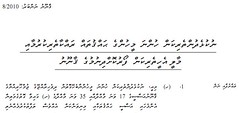source: minivannews.com
A Care Society project, providing educational services to 48 students with disabilities in Male’, is under threat because of a lack of funding.
The centre has been providing four weekly classes to the students, whose ages range from two to 26 years of age, since 2001.
“When we broke the news to the staff, they said, we might be able to find other work, but what about the students, where will they go?” said Fathimath Nizam, assistant director of the NGO.
With savings and donations for the NGO’s Care Development Centre (CDC) due to dry up at the end of September, Care Society is turning to members of the public, resorts and businesses to sponsor a student for Rf1,000 (US$78) a month for a minimum of a year.
Some parents had expressed a readiness to pay Rf1,000 a month, said Fathimath. “They said please don’t stop it, we are ready to pay the money. If you stop there’s no future for these students.”
But, she said she believed the financial burden would be too great for others to carry, especially as taking care of a child with a disability was costly.
Individual needs
The sponsorship money will be added to the Rf16,000 (US$1,245) a month pledged by the ministry of education to cover the salaries of four teachers.
Fathimath said the teachers were paid only a basic salary. “But they are working here because they are very passionate and they love these kids,” she said.
One of the teachers, Shiyaza Mohamed Didi, 29, who has been working at CDC for eight years, said the centre’s focus was on teaching independent, communication and social skills to the students.
Each child undergoes a functional assessment so that a programme can be tailored to their individual needs, she said.
“They have the same rights as normal children and for the centre to close down would be depriving them of these rights,” said Shiyaza.
Progress
Salma Ali, the mother of a 14-year-old Ahmed Aleef, who suffers from cerebral palsy, said parents of the students were “very sad and very worried” to hear that the centre might be forced to close down.
She said Aleef, who had been attending classes for the past eight years had made great progress.
“His movements have improved and he’s now able to read and write,” she said. “He now reads stories for himself.”
Another concerned parent, the mother of a 12-year-old girl with autism, who spoke on the condition of anonymity, said her daughter was completely dependent on her before attending the centre two years ago.
She was now able to got to the toilet independently and alert her parents to her needs.
“I’m very worried, wondering what I’m going to do as there’s no place in the Maldives, however small, that provides services for children with special needs,” said the girl’s mother.
She told Minivan News she believed it was the government’s responsibility to provide financial assistance for the continuance of the programme and that every school should have at least one classroom to cater to children with special needs.
“Everyone should cooperate and try to help these children instead of letting them waste away,” she said.
Knocking on every door
Shifa Mohamed, deputy minister of education, said the Minister of Education Mustafa Luthfy had formed a committee to look into special needs after assuming office in November last year.
She added Care Society had played a major role in helping children with disabilities and opening up the issue of special needs to the whole nation.
“If funding will be stopped, it’s a concern for everyone,” she said.
Care Society first registered in 1998 and has been promoting the rights of people with disabilities, children and women as well as assisting survivors of natural disasters, such as the tsunami, since its inception.
At present, the NGO runs another two other projects, said Fathimath. The first is a community-based rehabilitation programme which assists people with disabilities living on Gaaf Dhaal atoll Thinadhoo and Addu atoll Hithadhoo.
The second is a disaster risk management programme which aims to help schools become safer environments. Both have sufficient funding until next year, said Fathimath.
“Right now we will be knocking on every door,” she said. “I feel that there are people who can contribute Rf1,000 (US$78) a month.”
To sponsor a student or find out more information, please contact Aminath Luha at the Care Society on +9603312491.




